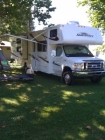Since snowbirding season is still in full swing, we bring you another snowbirding post. This time, Marty and Patsy Martin from Napkin Dreams tell us about snowbirding from a family perspective and give advice to other RVing parents trying to navigate their way through snowbirding season. We have several great blog posts coming up, including a post about the junior ranger program mentioned in this post.
When the average 40 year old thinks of RVing in Arizona in the winter, he probably conjures up thoughts of retirement and the golden years. You know, traveling around to the south with a little bitty dog and plenty of free time. That would be the normal picture.
Our family has never chosen the normal route.
We didn’t want to wait for our retirement years to travel this great country. We wanted to make memories with our kids. We wanted to enhance their education by living history and experiencing science. We wanted to enjoy traveling today because there are no guarantees for tomorrow. So with the ability to work from anywhere, we loaded up our newly christened RV Howard, laid out a rough travel plan and headed out on a two year adventure with our five boys and python snake.
That’s right, five boys, dad, mom and a snake in a 32-foot recreational vehicle! Some may call us loony, but we actually like each other and like being together, so it’s working out pretty good four months into the venture. Naturally part of the plan was spending the winter months in the warm states and the summer months up north. This fall went fairly smooth as we visited Missouri, Oklahoma and Kansas. The campgrounds and parks were quiet during the weekdays and full of activity during the weekends.
Then we moved a little farther south and hit snowbird time and territory. We have spent the last two months in Texas, New Mexico and Arizona. All in all we have had a very positive experience mingling with the retired set. There have been some pitfalls but numerous good points of RVing during the height of Snowbird season. And I think it is safe to say that, for the most part, we have enjoyed it. But we have had to make a few adjustments.
First the challenges: The biggest challenge is finding an RV park that accepts children.
Actually many parks say 55+, so even my wife and I don’t fit the criteria. And often, it is hard to identify the parks that only accept seniors. There is nothing more embarrassing than driving into a park, registering, and then be told we can’t stay once they find out we have children. Some areas are far more difficult to find RV parks that accept families than others. By far the most difficult locality to find a place to stay that we have encountered is the Phoenix and Tucson areas. We found southeast Texas parks to be very inclusive of families. In fact, we didn’t find any RV parks that had a problem with children. It was a little surprising to us to find ourselves having such a hard time in New Mexico and even worse in Arizona.
Now I understand why some parks and also their patrons want this type of exclusivity. There has been a time or two when we have been parked next to a pile of obnoxious kids who were loud, bullies, destructive or in short just plain and simple problem children. Most families do a good job of keeping their kids in hand, but the frightful few hurt the rest of us. Of course even the best behaved kids can have bad days and melt downs, so I could never guarantee that my own five wouldn’t be disruptive in these quiet little RV parks. So far though, we have had no complaints!
In light of this issue we have boondocked in a few places, but this leads to another issue. Several places along the road we have found Wal-Marts that posted signs reading “No overnight parking.” I wonder if this is because of pressure from local RV parks? So what is a family to do? Unwelcome in the RV park and at Wal-Mart? Research has been our answer. For this internet access is a must. We have been able to find family-friendly RV parks in most major towns after a lot of research on websites.
Our second challenge – cost.
Many parks that can easily fill up during snowbird season, do not accept the half-priced club we belong to, so we have paid quite a bit more in staying at these parks then we were accustomed too. I suppose if we had decided to winter up in the north we wouldn’t have this problem, but aren’t willing to make quite that much of a concession for a saving a few bucks.
Our third small challenge (which hasn’t been a big deal for us) is dining out.
When staying in Branson, at the beginning of our adventure, we spoke with a nice retired gentleman who gave us some helpful hints. One of his hints involved the “Blue Hairs” as he called his flock. “When you are in Mesa and other such points this winter, wait to go out to dinner until about 6:30. Us "Blue Hairs" like to eat at 4:00 pm and you’ll never get a seat for a big family until later.” Since we don’t frequent restaurants all that often this hasn’t proved to be a huge issue for us. But it is definitely something to think about when you are planning to eat out.
 Now, the benefits of RVing during the winter season are almost as numerous as the challenges.
Now, the benefits of RVing during the winter season are almost as numerous as the challenges.
Benefit - Our kids seem to find foster grandparents everywhere
We have thoroughly enjoyed hobnobbing with the snowbirds. The biggest benefit is that our kids seem to find foster grandparents everywhere. While we were in Corpus Christi over Christmas, our kids were fussed over and even given special gifts.
On Christmas Eve we all went to a Christmas Karaoke being held at the RV Park’s Community Hall. All of our kids were asked to come up front and sing along with the microphones. Then they were given roaring applause and hugs from the retirees in attendance. Even our teenager enjoyed the attention and gave some bows, hamming it up as usual.
One of the retired couples told our boys that if they were really good on Christmas Eve, Santa could make it snow sand dollars. It was with wonder-filled eyes that our sons opened the blinds on Christmas morning and found sand dollars hanging all over our tented dining area outside the RV. Those sand dollars are now a cherished Christmas ornament and will probably be a memory that we will re-tell every year throughout our son’s lives.
Our children are always greeting and meeting the four-legged “children” of the snowbirds, which is usually fun for both ends of the generational spectrum! Even on tours and sites, the retirees have been very friendly and effusive in their attention to our kids, making them feel welcome and special.
Benefit - Offseason travel leads to relative lack of crowds
One of the other benefits of visiting sites like the USS Lexington in Corpus Christi or Carlsbad Caverns in New Mexico during offseason is the relative lack of crowds. It’s been wonderful to roam around sites like these and be able to learn about them without crowds pushing and jostling each other to get a better view. There are even fewer crowds at activities like the junior ranger programs and swimming at the beach! Most of the park rangers at national parks have given our kids an amazing amount of personal attention, answering all their questions and sharing their knowledge with our kids. In fact, we have tried to make sure that we take our sons to most of these places when other families have their children in school.
Benefit - Escaping cold weather reports
Of course, the biggest benefit of RVing in the south during Snowbird season is that we can sit back and smile as we listen to all the reports of cold weather, snowstorms and icy roads. It’s quite possible that our senior southern travelers have understood this all along. Once again, we find ourselves learning from our elders.
Marty and Patsy Martin began their travels with their children around the USA and Canada in September, 2010. You can follow their full-time RVing adventures on their blogs at www.napkin-dreams.com or kirace.com (look under the blogs than find French Fries Under the Seat). You can also learn more about their traveling ministry at www.kidologytogo.org.